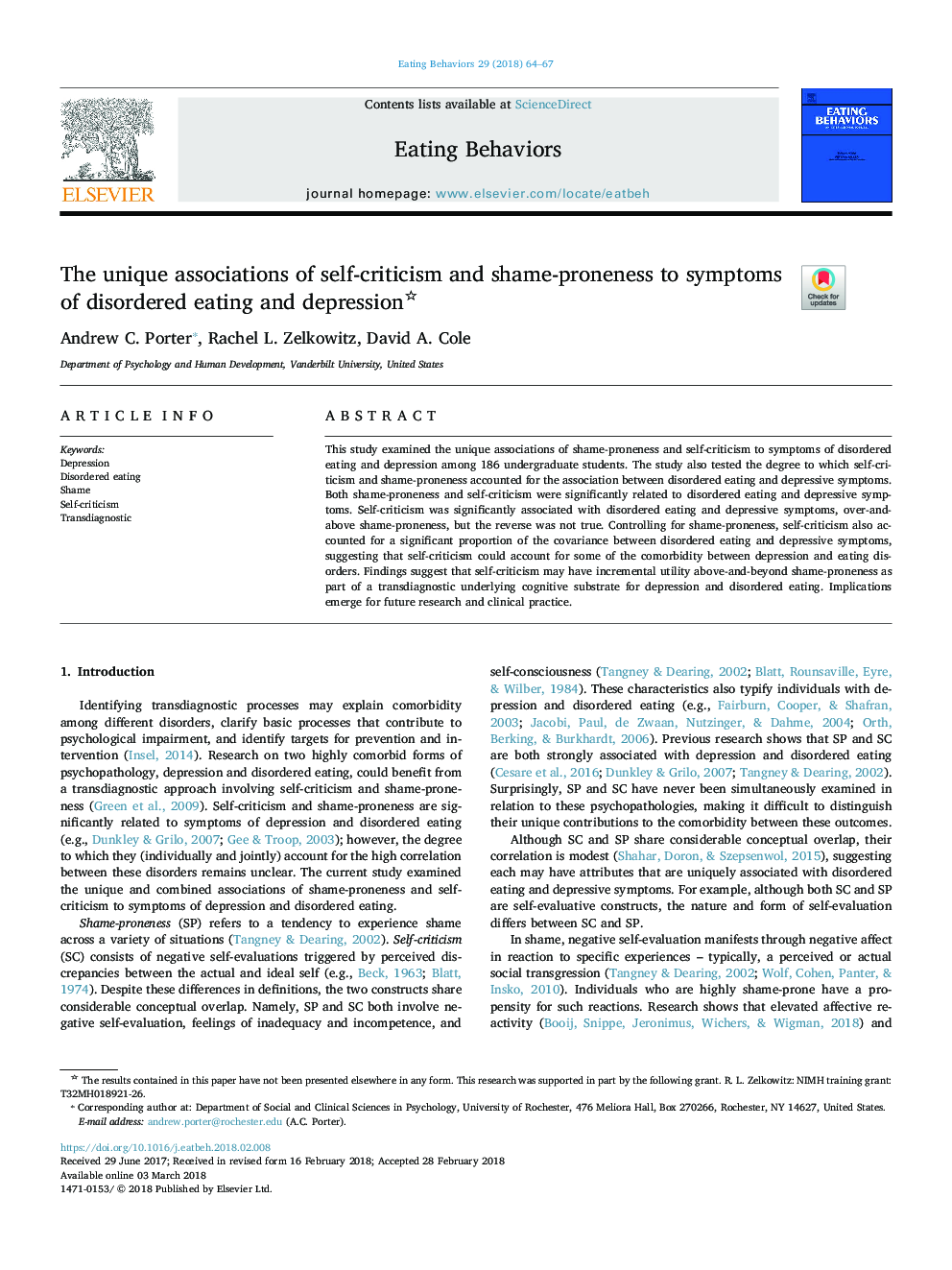| کد مقاله | کد نشریه | سال انتشار | مقاله انگلیسی | نسخه تمام متن |
|---|---|---|---|---|
| 7264917 | 1472874 | 2018 | 4 صفحه PDF | دانلود رایگان |
عنوان انگلیسی مقاله ISI
The unique associations of self-criticism and shame-proneness to symptoms of disordered eating and depression
ترجمه فارسی عنوان
انجمن های منحصر به فرد از خود انتقاد و شرم آور به نشانه های غذا خوردن اختلال و افسردگی
دانلود مقاله + سفارش ترجمه
دانلود مقاله ISI انگلیسی
رایگان برای ایرانیان
کلمات کلیدی
افسردگی، خوردن ناهنجار، شرم خود انتقاد، ترشحات تشخیصی
ترجمه چکیده
این تحقیق از میان 186 دانشجوی کارشناسی، انجمن های منحصر به فردی از شرم آور بودن و خود انتقاد به علائم غذا خوردن و افسردگی ناسازگار را مورد بررسی قرار داد. این مطالعه همچنین میزان اعتماد به نفس و شرم آور بودن رابطه بین غذا خوردن بدون اختلال و علائم افسردگی را بررسی کرد. هر دو شرمساری و خود انتقاد به طور قابل توجهی با غذا خوردن اختلال و نشانه های افسردگی ارتباط داشتند. خود انتقاد به طور قابل توجهی با غذا خوردن اختلال و علائم افسردگی مرتبط بود، بیش از حد شرم آور بودن، اما معکوس درست نیست. کنترل انتقاد از شرم و ترس، همچنین بخش قابل توجهی از کوواریانس بین غذا خوردن اختلال و نشانه های افسردگی را تشکیل می دهد، و این نشان می دهد که خود انتقاد می تواند منجر به تعدد اختلالات میان افسردگی و اختلالات خوردن شود. یافته ها نشان می دهد که خود انتقاد می تواند ابزار افزایشی بالاتر و بالاتر از شرم آور بودن را به عنوان بخشی از یک فرآیند شناختی فرعی تشخیصی برای افسردگی و خوردن اختلال ایجاد کند. نتایج تحقیق و عمل بالینی در آینده بوجود می آیند.
موضوعات مرتبط
علوم زیستی و بیوفناوری
علم عصب شناسی
علوم اعصاب رفتاری
چکیده انگلیسی
This study examined the unique associations of shame-proneness and self-criticism to symptoms of disordered eating and depression among 186 undergraduate students. The study also tested the degree to which self-criticism and shame-proneness accounted for the association between disordered eating and depressive symptoms. Both shame-proneness and self-criticism were significantly related to disordered eating and depressive symptoms. Self-criticism was significantly associated with disordered eating and depressive symptoms, over-and-above shame-proneness, but the reverse was not true. Controlling for shame-proneness, self-criticism also accounted for a significant proportion of the covariance between disordered eating and depressive symptoms, suggesting that self-criticism could account for some of the comorbidity between depression and eating disorders. Findings suggest that self-criticism may have incremental utility above-and-beyond shame-proneness as part of a transdiagnostic underlying cognitive substrate for depression and disordered eating. Implications emerge for future research and clinical practice.
ناشر
Database: Elsevier - ScienceDirect (ساینس دایرکت)
Journal: Eating Behaviors - Volume 29, April 2018, Pages 64-67
Journal: Eating Behaviors - Volume 29, April 2018, Pages 64-67
نویسندگان
Andrew C. Porter, Rachel L. Zelkowitz, David A. Cole,
